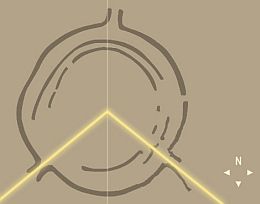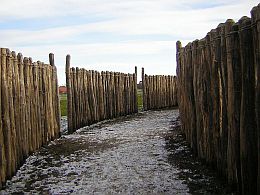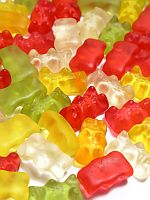Interesting Facts about Germany
Great Inventions, Environment & German Life
In this collection of interesting facts about Germany you will read about the environment, famous inventions & discoveries and tidbits about everyday life in Germany.
Deutschland is known as "das Land der Dichter und Denker" (the country of poets and thinker). German literature and classical music are recognised internationally. Well-known and less-known inventions made their way around the world.
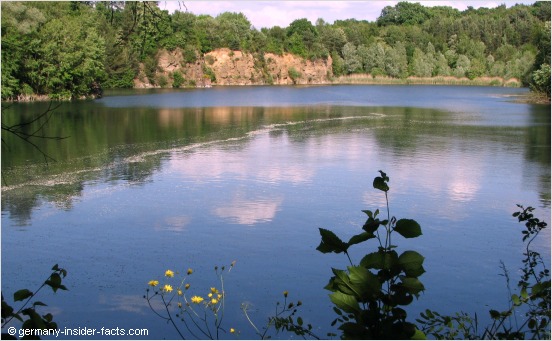
However, it is the trivia of everyday life that helps people from abroad to discover what makes the Germans tick.
You love to listen to good-natured gossip? Read on and discover some insider stories and fun facts about life in Germany.
Fun facts about Germany
There are quite a few fun and interesting facts about Germany and German life that surprise foreigners again and again.
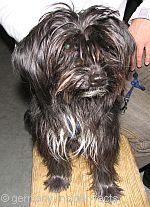
Cute dog at a party
Some cynics even say that animals, especially dogs, have more freedom than children in Germany. I don't agree with this point of view!
However, the downside of our love for dogs is, that you have to be careful when you walk around, there is dog poo nearly everywhere on footpathes in Germany. Unfortunately, many Germans are not willing to remove what their dog left in public places. Don't get me wrong, I love animals, and dogs, but sometimes this is too much.
In Germany it is allowed to take a dog to restaurants and department stores. A fact that surprises many foreign visitors. However, dogs need to stay outside in shops and at markets where food is sold.
Facts & Events
Travel Tips
German States
Foods & Recipes
Culture & Customs
More Interesting Facts
- Every second German has a car, and we use those cars! Listen to the traffic jam reports on local radio stations, and you know what I am talking about. It takes a lot of patience to reach a workplace in densely populated areas during the rush hour.
- Public transport is fairly good. Especially in the congested regions you don't need a car to get around. The long distance trains in Germany are fairly effective as well.
Check out the train travel section for tips on how to travel by train. - The "TV station Paul Nipkov" was a station Berlin that began the first television broadcast on 22.3.1935. Although only 250 televisions excisted around Berlin, this was the first regular televison service in the world.
Much has changed since then. On average Germans spend about 3 hours a day watching TV. - When you rent a house, or a flat, it is most certainly unfurnished. No kitchen equipment, no closets, you have to bring/buy everything yourself. Sometimes flats are let for hire with bare walls and floors, so tennants can choose the wallpaper and carpets to design their new home to their own taste.
- The typical German home in a modern rented flat has a large living room, and 1-3 smaller rooms. Then there is a kitchen and a bathroom. The size of flats varies. In older blocks of flats, apartments are usually smaller than in new ones.
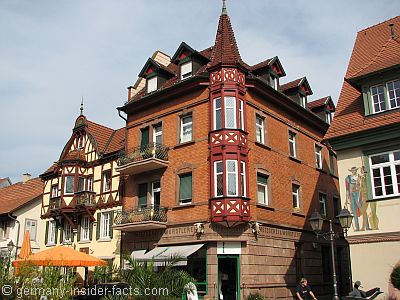
Beautiful old houses in a small village in the central black forest
Although living in one of the wonderful old buildings in Germany might lack some modern standards, still, I love old houses.
Inventions & Discoveries
Albert Einstein is probably the most influential and recognised scientist born in Germany. However, there are many more German inventions which influence our every day life.
Here are a few worth to mention.
- Robert Koch discovered and isolated the Tuberculosis bacillus in 1882. He is considered to be one of the founders of microbiology. Koch was awarded with the Nobel Prize in 1905. He founded the Prussian Institute for Infectious Diseases which was later renamed the Robert Koch Institute.
- Gummi Bears

The famous Haribo slogan "Haribo macht Kinder froh - und Erwachsene ebenso" (Haribo makes children happy - and adults as well) says it all. Haribo (an acronym of Hans Riegel Bonn) was founded in Bonn in 1920 by Hans Riegel. The first Goldbears were produced in 1922.
Want to know the different flavours of gummi bears?
Dark red = raspberry, bright red = strawberry,
orange = orange, green = apple, yellow = lemon, white = pineapple.
BTW, the advertising partnership between Thomas Gottschalk and Haribo is the longest running ad partnership, according to the Guinness World Records. - 1886 Gottlieb Daimler and Karl Benz developed simultaneously the first motor-driven vehicles.
Other famous Germans who invented different kinds of engines were Rudolf Diesel, Nikolaus August Otto and Felix Wankel. It took until the 1920s, but finally, the automobile conquered the world. - Aspirin - Although chemists and scientists experimented with acetylsalicylic acid in the 19th century, it took until 1899 that Dr. Felix Hoffmann and Bayer dubbed the drug Aspirin. The success of acetylsalicylic acid and Aspirin soon went around the world.
- Johannes Gutenberg (1398-1468) invented mechanical movable type printing and an oil-based ink. The world's first Bible was printed in Mainz in 1456. Imagine this revolution! Books could be printed on a large scale and made available for the general public.
- Wilhelm Conrad Röntgen discovered the X-rays in 1895
Nature and Environment
Germans love to escape into the nature on weekends, either by car or bicycle, even on foot. The first warm days in spring see hordes of walkers and cyclists on popular walking tracks along rivers and in forests. But there is always a way to avoid the crowds and find a tranquil place.
- Nearly one third of Germany's area is covered with forests and woods. Even in the densely populated regions, a green recreation area to escape from the city is never far away.
With 42 % of its area covered with forests, Hessen has the highest proportion of woods in Germany.
Schleswig-Holstein has the least area covered with forests. In this mostly flat country you can enjoy the wide open spaces where the sky meets the horizon. - Germany has about 250 registered zoos, animal and wildlife parks. Additionally, there are probably about 500 smaller wildlife parks and animal displays open to the public.
- The German Green Party was founded in 1980, and won their first seats for the Federal Parliament (Bundestag) in 1983. The first red-green alliance was formed in Hessen in 1985. The Greens have been part of a Federal Government coalition from 1998 to 2005.
- The use of atomic power has been a highly controversial subject since the first nuclear power plant was built. Nuclear power phase-out has been a major topic of election campaigns.
In the wake of the nuclear disaster in Fukushima, the German government decided to switch-off all atomic power plants by the end of 2022. - Germans take care of the environment. We separate our garbage and recycle. German wind parks produce about 35 % of the world's wind energy (2005).
- The Goseck Circle in Goseck, Saxony-Anhalt, is considered to be the earliest sun observatory in the world. It is the best preserved of many similar structures in Germany. Wikipedia has more info about this.
